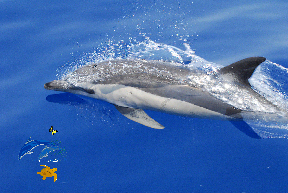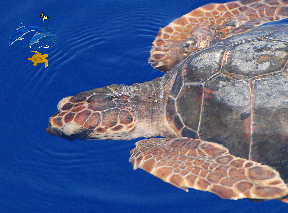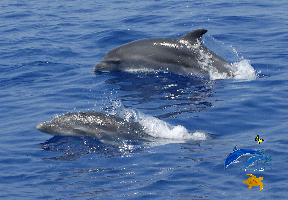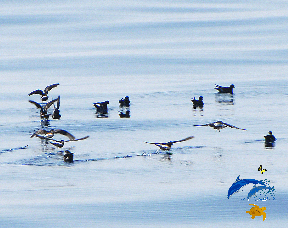Eco-Volunteering with BICREF in the Maltese Islands
Joanna Woods
Before beginning a degree in Natural Sciences at the University of Cambridge in October, I set about finding organisations where I could gain some valuable experience of scientific careers in conservation, in order to build up a portfolio of my future career options. Conserving marine life, especially cetaceans, is something I have always been passionate about, so I began by contacting the Biological Conservation Research Foundation, BICREF in Malta, which did give me the opportunity to join as a foreign eco-volunteer and to spend time with its members carrying out various activities important to marine research and conservation. Through this work I have learnt that effective conservation of any kind requires extreme determination and commitment.
 As conservation biologists, researchers and volunteers, the aim is not to elude the public with records of rich sightings, but to create a clear picture of what really inhabits the Mediterranean and how its inhabitants are being affected by natural and human impact. This can sometimes be disheartening work, with some long days of few and far between sightings, with raging sunburn as a reward. It takes great dedication and strength, as well as understanding that a day of little sightings is as important to biodiversity records and conservation as a day rich with dolphins, turtles, manta rays, shearwaters and storm petrels.
As conservation biologists, researchers and volunteers, the aim is not to elude the public with records of rich sightings, but to create a clear picture of what really inhabits the Mediterranean and how its inhabitants are being affected by natural and human impact. This can sometimes be disheartening work, with some long days of few and far between sightings, with raging sunburn as a reward. It takes great dedication and strength, as well as understanding that a day of little sightings is as important to biodiversity records and conservation as a day rich with dolphins, turtles, manta rays, shearwaters and storm petrels.
To build a clear picture of what is out there takes years of studying, observing and analysing. This is a job of BICREF, founded by Prof Adriana Vella, conservation biologist at the University of Malta, whose members have put  their hearts and souls into with no materialistic rewards, for the past 10 years. All BICREF research and publications are funded with the help of sponsors, but none of the volunteers get paid and often have also had to fork out funds when organising activities.
their hearts and souls into with no materialistic rewards, for the past 10 years. All BICREF research and publications are funded with the help of sponsors, but none of the volunteers get paid and often have also had to fork out funds when organising activities.
The aim of the work is not enjoying a pod of dolphins performing around a boat, it is not partaking in a relaxing scuba dive along a reef, it is collecting detailed scientific information. It not only requires the recording of biotic and abiotic factors and interactions, but also the detailed analysis of data to produce valuable conclusions that may take years of work to obtain after struggling for funds to cover costs.
It  was impressive to note the great care taken by BICREF workers not to disturb the environment and the species living in it whilst making observations, as their aim is to research and conserve the natural world without interfering with it. As a volunteer with BICREF I have seen first hand the importance of achieving a balance between collecting data whilst avoiding becoming a nuisance in the organisms’ homes. Unobtrusive behaviour comes far over and above data collection, the organisms welfare comes first. After all, members take time out of their studies, jobs and home lives to organise and carry out vital unpaid work, solely with the aim of promoting the protection of Mediterranean organisms and habitats found around the Maltese Islands.
was impressive to note the great care taken by BICREF workers not to disturb the environment and the species living in it whilst making observations, as their aim is to research and conserve the natural world without interfering with it. As a volunteer with BICREF I have seen first hand the importance of achieving a balance between collecting data whilst avoiding becoming a nuisance in the organisms’ homes. Unobtrusive behaviour comes far over and above data collection, the organisms welfare comes first. After all, members take time out of their studies, jobs and home lives to organise and carry out vital unpaid work, solely with the aim of promoting the protection of Mediterranean organisms and habitats found around the Maltese Islands.
You may wonder what all this research can achieve.  With ongoing efforts to promote and encourage the protection of coastal and marine environments, significant differences can be made. Publications are released to target a diverse range of communities with posters, DVDs, magazine articles, photo exhibitions and radio and TV interviews. With these publications, BICREF are reaching out to the entirety of the general public, such as; children, the yachting communities, SCUBA divers, students, fishermen and tourists.
With ongoing efforts to promote and encourage the protection of coastal and marine environments, significant differences can be made. Publications are released to target a diverse range of communities with posters, DVDs, magazine articles, photo exhibitions and radio and TV interviews. With these publications, BICREF are reaching out to the entirety of the general public, such as; children, the yachting communities, SCUBA divers, students, fishermen and tourists.
Presenting photos, and reports of what rich biodiversity the Maltese Islands are blessed with, allows the public to form opinions from accurate information regarding their wildlife and heritage.
BICREF draw attention to things that the general public can do to take part in conserving their natural world themselves. Something such as placing a plastic bottle into a recycling bin instead of leaving it free to blow into the sea may seem like a small task, but can be of huge benefit to the marine organisms that may eat it later when it arrives in their homes.
There are many threats the marine world has to face on a daily basis, many of which BICREF works towards decreasing, by increasing local awareness. However it is not only the responsibility of BICREF; we all need to act now. I urge anyone and everyone to give something, small or large, to our environment. Be it picking up a plastic bag and safely disposing of it, or becoming an active BICREF volunteer. It can all make a difference.
The opportunity to work with BICREF has been invaluable to me, as I can now appreciate more the crucial work undertaken by Prof. Adriana Vella and BICREF, as well as the sheer dedication and passion required to work in this field. I certainly will take home this bag of experiences, education and emotions and will not forget the wonderful site of common dolphins, a species, despite the name, classified as endangered in the Mediterranean, which I had the privilege to observe in its natural setting around the Maltese Islands.
Indulge any interest you may have in the marine world by viewing the BICREF website for a taste of the important conservation work done:
Website: www.bicref.org
Email: bicref@gmail.com
Report your sightings out at sea here.

